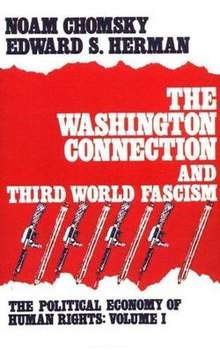The Political Economy of Human Rights
The Political Economy of Human Rights is a 1979 two-volume work by Noam Chomsky and Edward S. Herman. The authors offer a critique of United States foreign policy, particularly in Indochina.
 | |
| Authors | Noam Chomsky Edward S. Herman |
|---|---|
| Country | United States |
| Language | English |
| Subject | Foreign policy of the United States |
| Publisher | South End Press |
Publication date | 1979 |
| Media type | |
| Preceded by | Counter-Revolutionary Violence: Bloodbaths in Fact & Propaganda |
| Followed by | Manufacturing Consent: The Political Economy of the Mass Media |
Summary
Chomsky and Herman discuss United States foreign policy in Indochina, with significant focus on the Vietnam War. They include sections on the My Lai Massacre, Operation Speedy Express and the Phoenix Program.
The authors challenge received wisdom on foreign policy, presenting a stark critique of the international human rights record of the United States and an indictment of the American media and of academic scholarship, alleging their complicity in this record. The two volumes are:
- The Political Economy of Human Rights, Volume I: The Washington Connection and Third World Fascism (1979). ISBN 0-85124-248-0. ISBN 0-89608-090-0.
- The Political Economy of Human Rights, Volume II: After the Cataclysm: Postwar Indochina and the Reconstruction of Imperial Ideology (1979). ISBN 0-85124-272-3. ISBN 978-0896081000.
The first volume is a greatly expanded version of Chomsky and Herman's Counter-Revolutionary Violence: Bloodbaths in Fact & Propaganda. It repeats the themes of "bloodbath" and "terror" classification and the categories and examples discussed include:
- Benign – East Pakistan in 1971, Burundi in 1972; Indians of Latin America, particularly the genocide of the Aché of Paraguay, 1970s; East Timor, 1975–1979;
- Constructive – Indonesia in 1965–1966; French in Vietnam, 1950s; Diem regime in Vietnam, 1950s; the United States in Vietnam, 1960s; the United States in the Philippines, periodically from 1898 to 1979, when The Political Economy of Human Rights was published; Dominican Republic, 1965 to the 1970s, Latin America, from the American overthrow of the Guatemalan government in 1954 to the 1970s;
- Nefarious – Vietnamese revolutionary, 1950s and 1960s;
- Mythical – North Vietnamese land reform in the 1950s; North Vietnamese in Huế in 1968.
Reception
Not being published by a major house, The Political Economy of Human Rights received hardly any reviews in mainstream American newspapers and popular journals.[1]
See also
- Counter-Revolutionary Violence: Bloodbaths in Fact & Propaganda
- Manufacturing Consent: The Political Economy of the Mass Media
External links
References
- Shalom, Stephen R. (1980). "The Washington Connection and Third World Fascism. The Political Economy of Human Rights [Review]". Universal Human Rights. 2 (2): 84–86. doi:10.2307/761815. ISSN 0163-2647. JSTOR 761815.